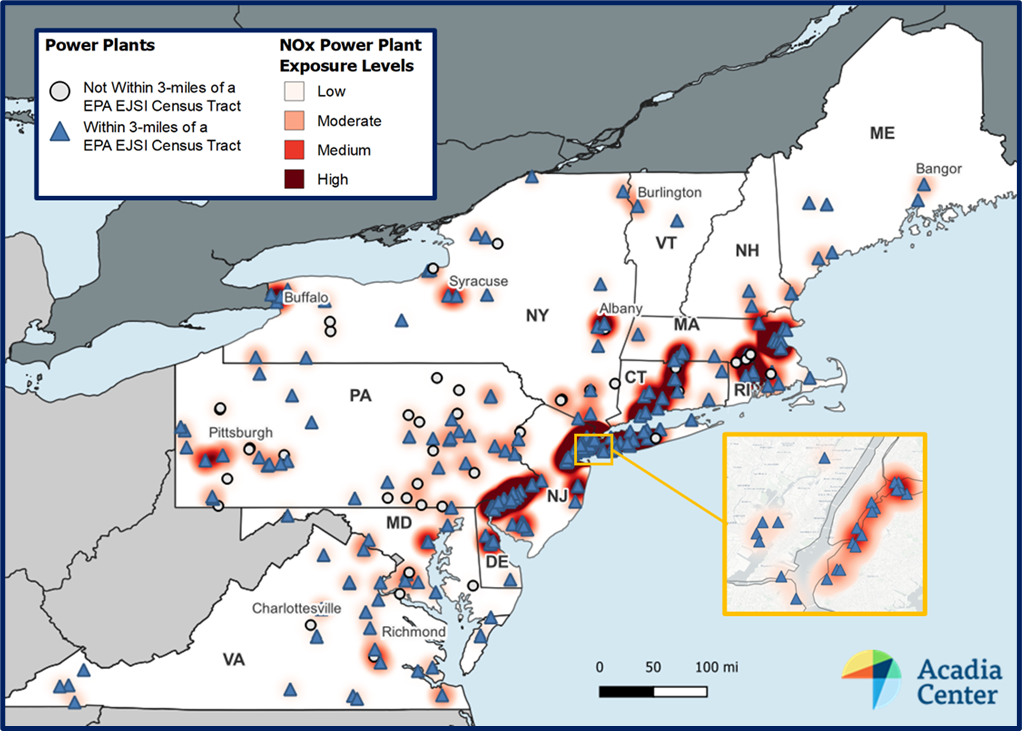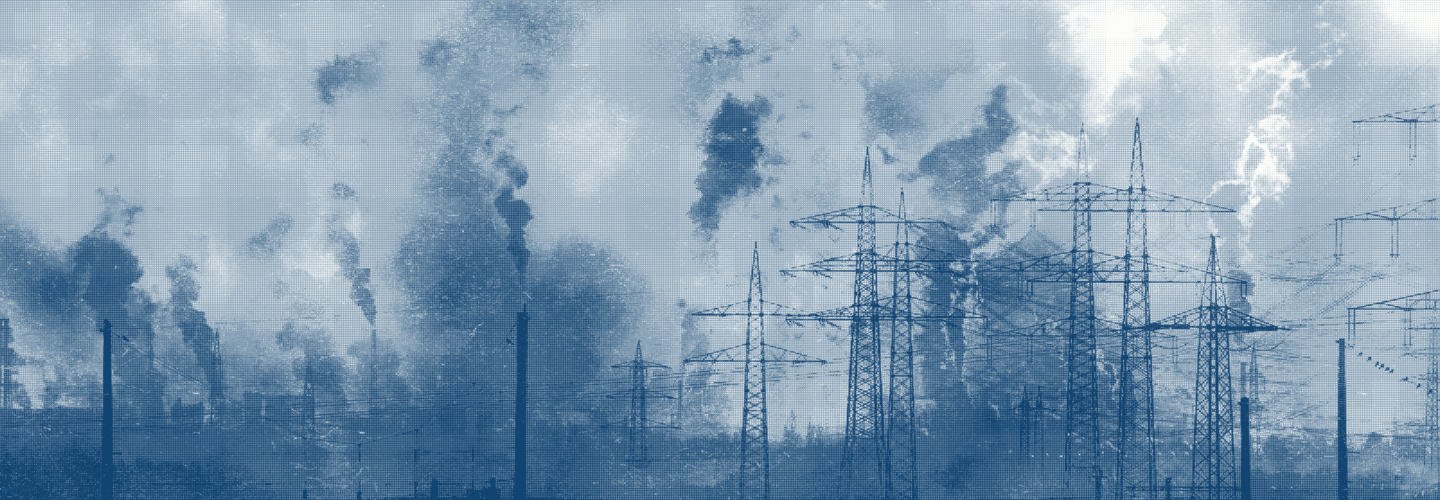After Fourteen Years of RGGI, Air Quality’s Up Next
Acadia Center today released a much anticipated sequel to our 2019 report RGGI: Ten Years in Review, taking stock of the impacts of the Regional Greenhouse Gas Initiative (RGGI) as it turns 14 and making recommendations for improvements as the participating states embark on the Third Program Review – happening now!
What is RGGI?
RGGI is a cap-and-invest greenhouse gas reduction program by 12 states in the Northeast and Mid-Atlantic designed to limit the amount of carbon dioxide pollution (CO2) from electricity generating plants in the region. RGGI has been a pioneer of climate policy, generating $6.2 billion in proceeds for participating states over the last 14 years. RGGI is the United States’ first multi-state program designed to reduce climate change-causing pollution from power plants and has provided a wealth of lessons to be incorporated into the next generation of climate policies, including successes to build on and opportunities for improvement.
Has RGGI provided benefits to participating states?
Yes! The nine states that have consistently participated in RGGI (Connecticut, Delaware, Maine, Massachusetts, Maryland, New Hampshire, New York, Rhode Island, and Vermont) have experienced a more rapid increase in GDP per capita and a more rapid decline in power sector CO2 emissions and retail electricity prices. From 2008 through 2021, Acadia Center found that the RGGI states experienced:
· A nearly 50% reduction in CO2 from power plants: 10% more than the 40 states that have not consistently had a price on greenhouse gas emissions (hereinafter “the rest of the country”)
· An increase in economic growth per capita of 50%: 13% more than the rest of the country
· A 3.2% decline in retail electricity prices compared to a 7.7% increase in the rest of the country
· A 91% decline in electricity generated from coal, and 808% growth in solar and wind
· An 85% reduction in nitrogen oxides (NOx) in RGGI-regulated power plants over the entire region. Criteria emissions, particularly NOx, can have significant detrimental health impacts including damaging the respiratory tract and increasing vulnerability to respiratory infections and asthma.
Are air quality benefits seen equally in all communities?
No. While air quality improved across the region, differences exist in localized impacts of power plants covered by the RGGI program. Acadia Center analysis found that, between 2008 and 2021:
· Over a third of RGGI plants that emit significant levels of NOx emissions are located near high asthma communities (census tracts above 90th percentile in CEQ data for adults with asthma).
· NOx emissions from power plants within 3 miles of an EJSI community (above 90th percentile on at least one of U.S. EPA’s EJScreen socioeconomic indicators) declined by 85%, compared to the rest of the RGGI power plant fleet, where NOx emissions declined by 88%.
· Over two-thirds of RGGI plants do not have an active air quality monitoring site within a 3-mile radius – and over three quarters of these unmonitored plants are near an EPA EJSI or high asthma community.
Acadia Center analysis also found that although only 41% of the census tracts in the region are classified as EPA EJSI Communities, 81% of RGGI power plants are located within 3 miles of EPA EJSI Communities. Similarly, although only 11.5% of all census tracts in the region are considered high asthma communities, 37.5% of all RGGI plants were located within 3 miles of a high asthma community. Although complicated by the fact that the 3-mile radius around each power plant often touches multiple census tracts, this comparison suggests that RGGI plants may be more likely to be located within 3 miles of an EPA EJSI community or high asthma community than a random distribution would create.

What should we do about that?
The Third Program Review in 2023 offers communities, affected groups, and the public a key opportunity to advocate for changes that create a more equitable and direct distribution of investments in environmental justice communities, use the power of regional cooperation to improve air quality and health of communities that surround the power plants covered by RGGI and better align RGGI with state climate and clean energy mandates.
What improvements does Acadia Center recommend?
Acadia Center recommends that during the Third Program Review the RGGI states should:
Align the Cap and Market Mechanisms with State Climate and Clean Energy Goals: Set the RGGI cap level at or below the emissions allowed under state clean energy and GHG reduction laws and adjust market mechanisms to support higher levels of decarbonization.
Ensure Environmental Justice Communities Directly Benefit: Require that no less than 40-50% of RGGI proceeds are invested in EJ communities, ensure meaningful participation in investment decisions by EJ community members, and transparently track and report expenditures and impact.
Use the Power of Regional Cooperation to Improve Health and Air Quality: Accelerate decreases in NOx emissions at the power plants that pose the largest respiratory health risks, and increase funding and enforcement of air quality monitoring, especially in EJ communities.
Lower the 25 MW Threshold Capacity for RGGI Regulation to 15MW: 91% of smaller generating units are within 3 miles of an EPA EJSI or high asthma community. By including all generating units of 15MW or higher, and lower for co-located units, RGGI could have a significant health benefit in these areas.
How do we know which plants should be targeted?
To help identify some of the most problematic power plants in the RGGI region, Acadia Center developed a “NOx pollution threat score”, based on how much NOx the plant emits, how many people live within 3 miles, and whether the plant is near EPA EJSI or high asthma communities. With this tool, we identified a RGGI NOx Threat Ten list of power plants that pose the largest respiratory health risks to EJ and high asthma communities and should be considered as a starting point for targeted emissions reductions.
How can I participate?
RGGI states will be offering public comment and listening opportunities in the coming months. Acadia Center will be offering a webinar on April 11, 2023, at noon (EST) to provide information from our RGGI Report that can be used in commenting to RGGI states in the public processes they will be starting soon. We will be preparing additional materials to help interested parties provide comments to the states.



















